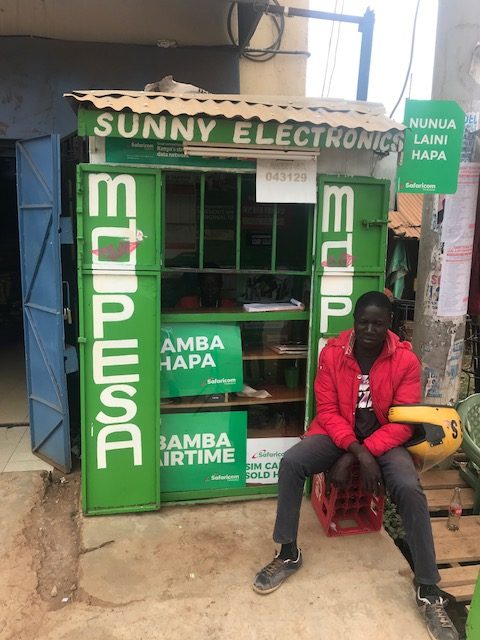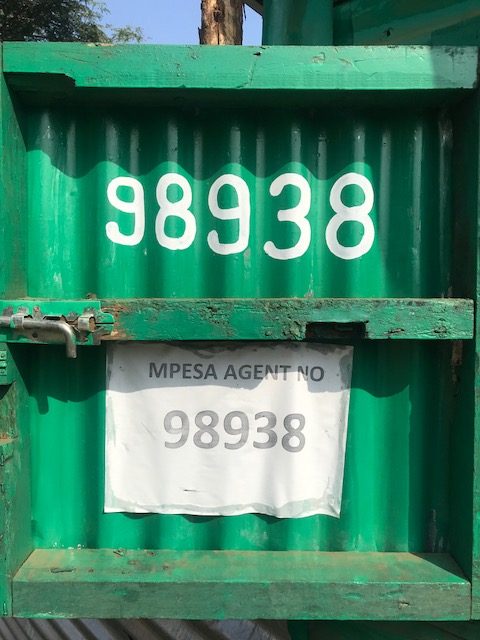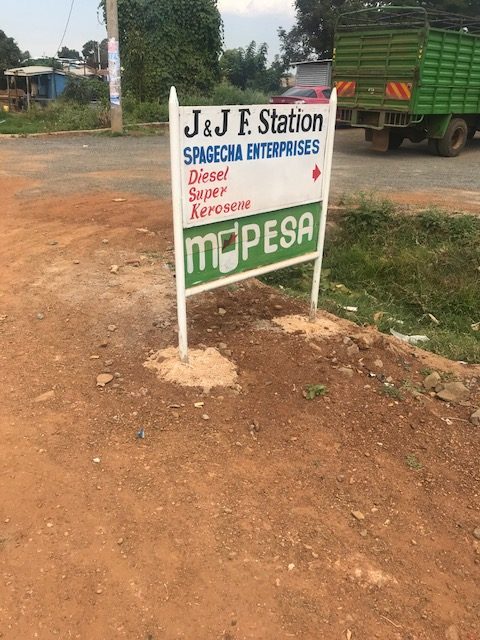Brand domination that stretches down street corners is not an unfamiliar concept in the West. Subway, for example, holds 27,000 stores in America, ten thousand more than any other store. In Kenya however, roads are consistently embroidered with a different green logo. Whether it be the bustling streets of Nairobi, the beaches of Mombasa, or the quiet rural roads of Siaya county, a small box shaped M-PESA kiosk will always be within eyesight.
What is M-PESA?
M-PESA, launched by Safaricom in 2007, is arguably the most advanced mobile money transfer system in the world. Pesa is Swahili for money, and today over a quarter of Kenya’s 175-billion-dollar economy runs through M-PESA transactions. It is universally popular, 96% of households outside Nairobi hold at least one M-PESA account. As a result, Africa’s first mobile money platform has now been adopted by Tanzania, India, South Africa, Afghanistan and even Romania and Albania.

How does it work?
M-PESA’s key to source of success as banking service does not come from its complex array of features but ability to give ease of access and inclusivity to banking. MPESA offers a bank account that is connected to your sim card, and therefore governed from your phone. Using pin secured SMS text messages, it allows you to pay in shops, send money instantly to other users, withdraw from your account, bank money, and even take out loans. So, no internet, no credit card, nor laptop or even smartphone required. Any phone will do.
M-PESA is a branchless; customers manage their account through a network of 80,000 physical ‘agents’, who hunch beneath small green kiosks dotted along the road. These agents act as banking clerks with a unique personal code scrawled above their kiosk, using which customers can send as little as 10 shillings and withdraw as little as 50 shillings from their account. These agents are essentially super users of the platform. They do not hold funds belonging to M-PESA, but are investors in their own mobile money to exchange for cash of customers. All agents are directly recruited by Safaricom and given specific training, then visited on site approximately once every two weeks.
Enabling the rural
MPESA holds great advantages to those in rural areas who may be without reliable internet connection or access to a nearby bank. When it was first launched the average distance to the nearest bank was 9.2 kilometres. Eight years later in 2015 the average distance to the nearest M-PESA agent was a mere 1.4km. Although it is the transfer function which is the most useful. Those in isolated areas can now send and receive money from others far away.
This means avoiding the risks and significant costs of transporting physical cash. This is especially important for developing countries such as Kenya which have high dependency ratios. This means the few who earn money have to support many others – the children, elderly, and the unemployed. Therefore, there is a frequent need to circulate money between family members.
Before M-PESA it was common practise for Kenyan’s to linger around bus stations, searching for someone who is travelling to their village and is also trustable enough to deliver money to their families.
Others have argued M-PESA therefore raises dependency, as it has become easier to rely on instant money transfers from family members rather than seeking employment alternatives when it was less reliable.
However, this effect is mostly outweighed by new employment and business opportunities brought by the ease of transactions. Rural Kenyan’s can nowduct trade with those outside their community using M-PESA, creating more risk diverse business networks.
This means mobile money are more equipped to protect themselves against bad economic shocks that may be specific to their community. For example, droughts, fires, livestock diseases and floods. In these events users can conduct business with other areas where demand remains stable.
Women and M-PESA
Despite gender inequalities rising over the last five years in Kenya, it seems mobile money has done a certain amount to counteract this affect.
A recent study of the long run effects of mobile money in Kenya found that M-PESA’s transaction function had induced an estimated 185,000 women to switch from subsistence farming to business or sales as their primary occupation.
For example, in the Lake Victoria region, the economy relies heavily on fishing. Men produce an income from fishing in the lake, but it is then the women’s role to sell it at local markets. Fish yields a higher price the further away from the lake it is sold. So women have the option to send their fish to customers throughout Kenya, but will having to take the lengthy journey themselves to conduct the transaction.
In the past this transport operation would be too costly and not feasible for a women to leave her family overnight to take fish to other regions. But now, where it may have taken a women two weeks to sell two bags of fish in Nairobi, she spends one morning buying and sending the fish on a bus. M-PESA allows women in the lake region to sell their fish at a higher price for a lower cost.

M-PESA also gives women the ability to save in a safer way. In Kenya, women have less access to the formal banking sector than do men. In many cases this is because women do not earn enough money to reach the minimum amount required to set up an account. For example, the Post Bank minimum balance required is Kshs 1200; for Equity Bank it is Kshs 150; for KWFT it is Kshs 500; and for Co-operative Bank it is Kshs 100. However, MPESA only requires that a customer have Ksh 1, equivalent to less than 1 pence, to keep their account open.
Before mobile money women were often forced to store personal amounts of cash in their homes, which was often taken by their husbands to buy alcohol or other personal items. Many women state that access to an M-PESA account has made it much less likely their savings are spent, than when they were kept at home.
Even under the circumstance a women’s M-PESA account is frequently accessed by their husband, there is still an option to create savings which are locked for agreed amount of time and not assessable under any circumstances.
This is called the M-Shwari function, which acts as an extension of your M-PESA account on your phone. Not having access to savings for an extended period can minimise the potential for financial disputes in the household over whether to withdraw it, which are a common cause of domestic violence in Kenyan households.
Surveyed women in the Lake Victoria region also professed this savings function has been crucial in enabling them to pay their children’s school fees. Especially as schools have increased the number of days children attend school, thus increasing the price of tuition.
Is M-PESA secure?
M-PESA is surprisingly secure. It is difficult to commit account fraud, as users must present their ID when withdrawing, as well as have their sim card and know their own M-PESA pin.
Having said this, an account connected to your mobile phone can present a risk that it becomes lost or stolen, which discourages account holders to save large amounts on their account. This is reflected by a study which found M-PESA is not commonly used as a saving mechanism because it is too risky, and holds a low storage of value.
In other respects, M-PESA accounts are safer than most others in the world. All funds are held by a Trust which Safaricom cannot access. This is because it is a requirement of the Kenyan central bank that the funds must always remain the property of M-PESA users, meaning account holders would not lose any money in the event Safaricom goes bankrupt.
M-PESA transactions are also regularly examined for evidence of money laundering in reports that are required by the Kenyan central bank. Although this aspect of M-PESA remains contentious. The US stat
e department accused M-PESA of being vulnerable to use by money launderers in multiple reports, as “criminals could potentially use illicit funds to purchase mobile credits at amounts below reporting thresholds.” Although these reports have not been substantiated with major evidence, and appear to take a jealous tone above all else.

The charming cartoon icon of M-PESA resembles an ironic simplicity that development experts have sometime failed to see. it makes a big difference for people to have greater control and safety over their immediate income. Rather than brandishing loans, investment, and interest as quick fixes for the worse off.


